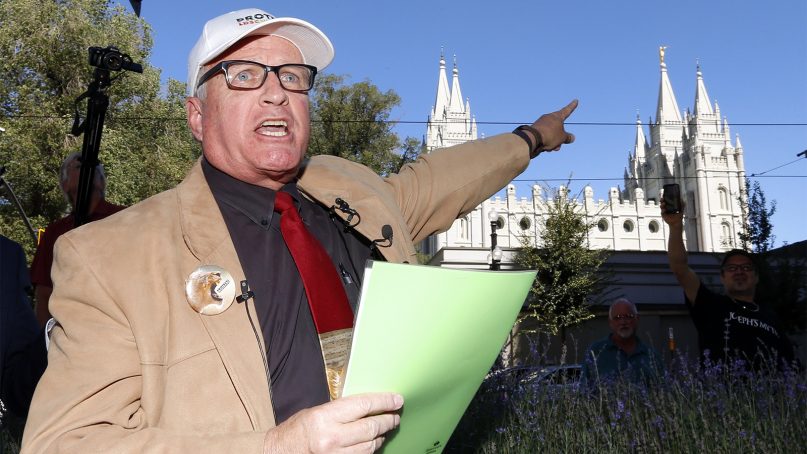On Sunday, former Mormon bishop Sam Young of Texas announced his excommunication from the Church of Jesus Christ of Latter-day Saints.
Young has actively and publicly campaigned for an end to the Mormon policy of allowing bishops to ask youth sexually explicit questions in worthiness interviews (see here). He read aloud his disciplinary letter in front of a crowd gathered at the Salt Lake Temple.
What’s on my mind today is how history repeats itself: specifically, what happened in the Mormon world exactly 25 years ago. I’m talking about the disfellowshipment or excommunication of the “September Six”—a half-dozen high-profile LDS disciplinary councils that were tried in Utah during a two-week period from September 14 to September 26, 1993.
Their cases were all different, but certain themes emerged: these various individuals had, in one way or another, all poked the bear of the institutional LDS Church. Most were feminists, and some were activists as well as writers and historians.
Their published criticisms proved too much for the Church, resulting in the wave of disciplinary actions. If the Church was hoping that the mini-purge would make the disciplined individuals’ voices disappear, however, that strategy backfired as the excommunications began receiving national media attention.
That’s where I first heard about them, in the pages of the New York Times. I was a divinity student at Princeton Theological Seminary at the time, and I tried to make it a practice to read the Sunday paper regularly (which was in paper newsprint then, back in the day).
I had a particular interest in the Times’s September 19, 1993 story about the unfolding LDS excommunication saga, as I was scheduled to be baptized as a Mormon myself the following week.
The excommunications’ effect on me was chilling. Here I was, a feminist who was training to be a historian, about to commit myself to a religious tradition that was at that very moment singling out feminists and historians for censure.
I prayed about it. Hard. The answer I received was that there would be a place for me in this church, not in spite of who I was and what I believed was right, but because of it.
I decided to go ahead with my baptism and lean on the religious faith I had discovered in the LDS Church, particularly my testimony of the Book of Mormon. I’ve never had serious cause to regret that decision. Here is the program from my baptism, which occurred 25 years ago next week. (And yes, this is that Mette Harrison, the wonderful novelist who sometimes guest posts here on RNS. It’s a small Mormon world.)

The answer I received in prayer was that I was loved and important, and that I had a place in the Church. I was to speak my mind, but do so whenever possible with love. This approach was confirmed in my patriarchal blessing some years later, which admonished me, “Do not hold back from saying the things you honestly believe if it will help the members of the Church” and said my job was to be “a leaven to discussions by providing different points of view” about the gospel. It then specifically mentioned my study of history and my responsibility to teach others what I felt was the truth. (By the way, this blessing came from a patriarch who did not know me or my background at all.)
I sometimes disagree with my Church – over same-sex marriage, for example, or the lack of women’s leadership – and over the years I have written about these disagreements. Sometimes (okay, many times) I have been accused by readers of “apostasy.” On at least one such occasion a reader even sent a marked-up copy of a blog post to my bishop, who, I later learned, promptly tore it up and threw it in the trash.
But excommunication for “apostasy” (which is an ill-defined and vague term) is actually rather rare in Mormonism. Since the September Six, only a handful — including podcaster John Dehlin, Ordain Women founder Kate Kelly, and Remnant fellowship leader Denver Snuffer – have gotten the axe for this reason, or the all-purpose “conduct contrary to the laws and order of the church” reason.
In recent years, the driving factor that distinguishes excommunicants from those of us who merely voice our disagreements seems to be whether we have started a movement around our ideas. Sam Young, for example, founded the website Protect LDS Children, organized a hunger strike for three weeks, and called news conferences to publicize his position.
If there’s a change between the LDS excommunications of a quarter century ago and the ones we’ve seen more recently, it’s that the people singled out now have all started organizations and active protests, rather than simply writing about controversial or inconvenient facts of history, like D. Michael Quinn did in 1993.
I have to wonder, 25 years after the September Six, what this means today. I differ from people like Kate Kelly, John Dehlin, and Sam Young more in temperament than I do in ideas. I’ve little energy for starting or even joining a movement. Some of my issues with the institutional LDS Church play a role in this reticence, actually, because the flaws I see in that institution’s default mode of self-protection and otherizing can be seen in just about any movement, political party, church, or government. Self-protection is what institutions do best, battening down the hatches whenever they perceive they are under attack.
But I hope the LDS Church is not planning another excommunication – either mine or anyone else’s – anytime soon.
Related posts:
- On Mormon teens, sex, and closed door “worthiness interviews” with middle-aged men
- “When I was a young girl, a Mormon bishop asked me about my panties during a temple recommend interview”
- On Mormon excommunications and official LDS Church apologies
- An in-depth look at every individual ever excommunicated by Jesus Christ in scripture






